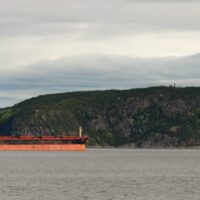In this “Beyond the Horizon” Canadian Marine Shipping Risk webinar on technology applications to mitigate shipping risk, Daniel Zitterbart with the Woods Hole Oceanographic Institution shares his work on Increasing Whale Detection Capacity in the Canadian Atlantic and British Columbia Waters by Utilizing Thermal Land- and Vessel-Based Automatic Detection and Classification System from Coast to Coast.
Daniel Zitterbart is an Associate Scientist, Applied Ocean Physics and Engineering, at the Woods Hole Oceanographic Institution (WHOI). His work in the Marine Animal Remote Sensing (MARS) Lab at WHOI uses remote sensing methods such as photography, satellites, radar, passive acoustic monitoring and robotics to study ecosystem health as well as behaviour and ecology of top predators. In this presentation, Dan shares his work on smart adaptive solutions to detect whales to avoid collisions with ships.




